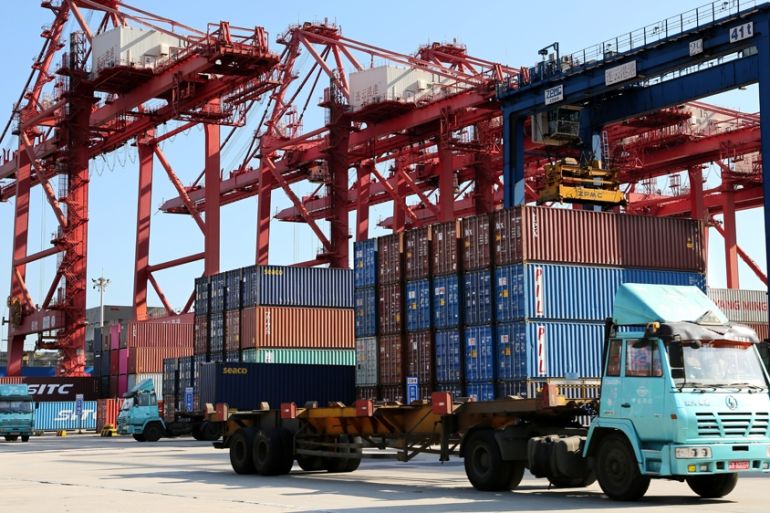Japan’s economy almost stalls as trade war bites
Growth in the third quarter slowed more than economists had expected as the US-China trade war dampened exports.

Japan‘s economy grew at its slowest pace in a year in the third quarter as the trade war between the United States and China and soft global demand knocked exports.
The latest figures mean that policymakers will likely remain under pressure to ramp up fiscal and monetary stimulus measures to bolster the fragile recovery.
Keep reading
list of 3 itemsAsian manufacturing slumps further as trade war persists
Japan’s exports slump for tenth straight month
Growth in private consumption also cooled from the previous quarter, casting doubt on the view of Japan’s central bank, the Bank of Japan (BOJ) that robust domestic demand will offset the effects from intensifying global risks.
The world’s third-largest economy grew at an annualised rate of 0.2 percent in the third quarter, slowing sharply from a revised 1.8 percent expansion in April-June, preliminary gross domestic product (GDP) data released by the government showed on Thursday.
It fell far short of a median market forecast for a 0.8 percent gain and marked the weakest growth since a two percent contraction in July-September last year.
“Domestic demand had made up for some of the weakness in external demand, but we can’t count on this to continue,” said Taro Saito, an executive research fellow at NLI Research Institute.
“A contraction in October-December GDP is a done deal. The economy may rebound early next year, but will lack momentum.”
The feeble data may heighten calls from legislators for the government to boost fiscal spending to support the economy, which many fear will take a hit from a sales tax increase that took effect in October.
Private consumption grew by 0.4 percent in July-September, slowing from a 0.6 percent increase in the previous quarter, despite stronger demand from households which sought to beat the October tax hike.
Capital spending, a rare bright spot in the economy, rose 0.9 percent in the third quarter, accelerating from the previous three months. That helped domestic demand add 0.2 percentage point to growth.
But external demand knocked 0.2 percentage point off GDP growth, as exports were hit by the protracted US-China trade war that has upended world supply chains and hurt the global economy.
Trade war strains
Markets have been on edge in the past month as the US and China seek to complete an initial trade deal to de-escalate their bitter tariff dispute.
US President Donald Trump on Tuesday dangled the prospect of completing the initial deal with China “soon,” but has so far offered no new details on the negotiations.
The dispute has already hit big exporters hard. Japanese electronic giant Panasonic Corp last month reported a 12-percent drop in its second-quarter operating profit due to slumping sales of electric components to factory owners.
Economy Minister Yasutoshi Nishimura said while Japan’s economy is likely to continue recovering moderately, the government will be vigilant to the effects from global risks and the sales tax hike.
“The fundamentals underpinning consumption remains firm. But consumer sentiment is weak, so we need to keep an eye out on developments,” he told reporters after the GDP’s release.
The data comes as the government plans to compile a package of measures for disaster relief and to protect the economy from heightening global risks.
The BOJ kept monetary policy steady last month but signalled its readiness to maintain or even cut already low interest rates to underpin a fragile recovery.
Prime Minister Shinzo Abe’s administration proceeded with a twice-delayed sales tax hike to 10 percent from eight percent in October as part of efforts to fix Japan’s tattered finances.
Government officials say the hit to growth from the tax hike will be smaller than the previous increase to eight percent from five percent in 2014, because of measures the administration has already taken to ease the effect on households.